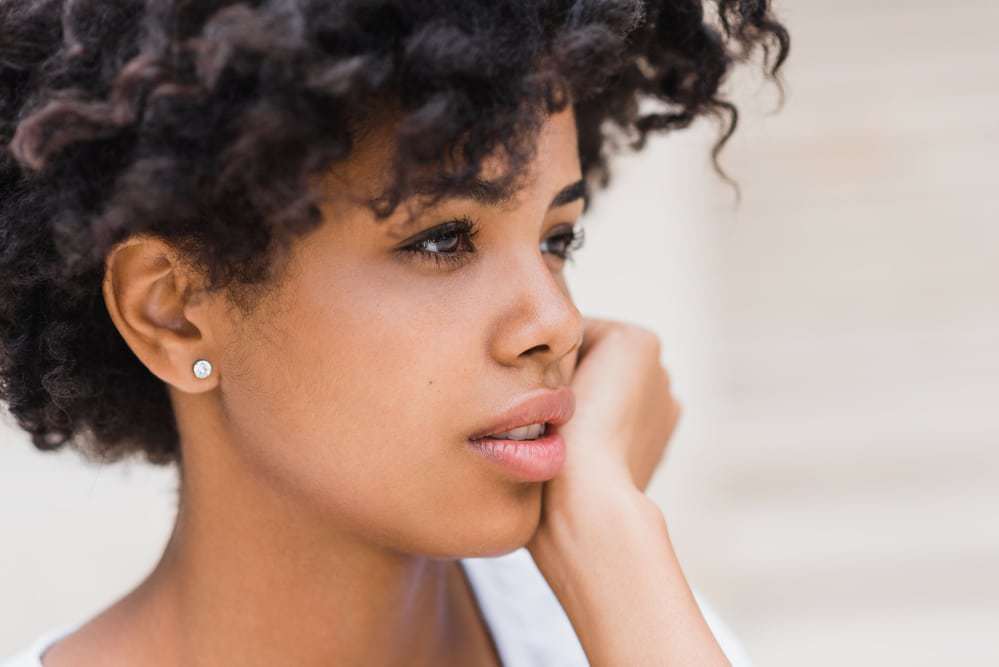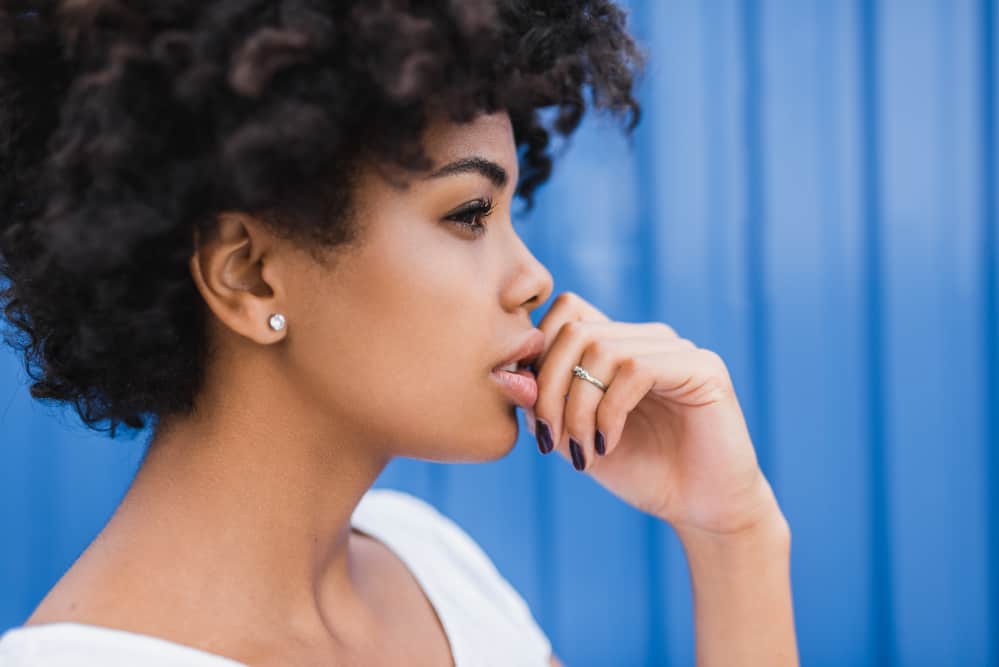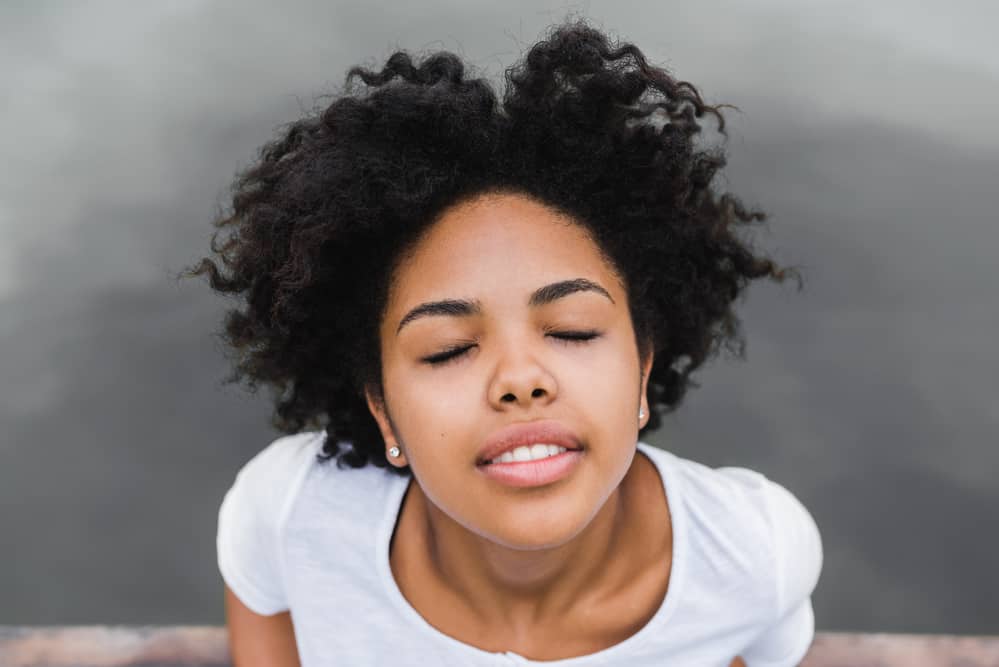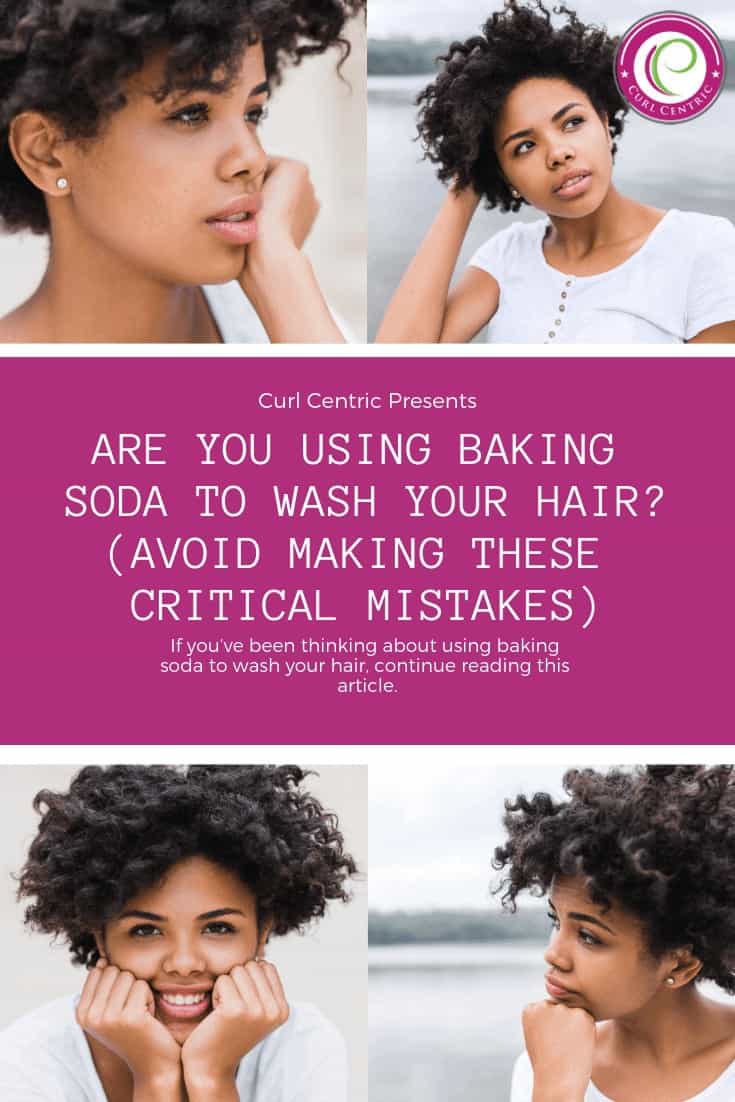
Curly girls all over the blogosphere are using baking soda to wash their hair as part of the “no-poo” movement.
All you need to do is a quick Google search and you’ll find pages and pages of women who have ditched their shampoos and cleansing conditioners in order to create their own DIY baking soda cleansers.
However, the real question is should you use baking soda to wash your hair? Or, generally speaking, should you use baking soda for hair care at all?
The short answer is simple. We don't recommend washing your hair with baking soda or incorporating baking soda into your natural hair regimen, although there are a few caveats and exceptions.
Table of Contents
- 1 The Benefits of Washing Your Hair with Baking Soda
- 2 Is There Any Evidence That Baking Soda Is Good for Your Kinky Curly Hair?
- 3 Understanding How pH Balance Affects Your Curls
- 4 There Are Risks to Using Baking Soda to Clean Your Curls
- 5 If I Can’t Use Baking Soda, What Can I Use?
- 6 Do You Still Want to Try Baking Soda Instead of Shampoo?
- 7 DIY Baking Soda Clarifier
- 8 What Is the Verdict?
The Benefits of Washing Your Hair with Baking Soda

Whether you are a reformed product junkie or your bathroom sink is currently overflowing with tons of hair care products, you have probably have had to deal with “product build-up.” It leaves an annoying film on your tresses that weighs down your hair and makes it dull and frizzy.
Some naturally curly girls believe that baking soda can help to strip away product build-up giving you a deep and revitalizing clean.
Not to mention, most ladies admit that the best part about “going natural” is finally being able to rid themselves of the harsh, potentially toxic chemicals and additives hidden in commercial relaxers, shampoos, and conditioners.
We haven’t even gotten into pricing yet. Trust us, if you aren’t careful you can end up blowing your budget on deep conditioners and styling gels before you know it.
Incorporating baking soda rinses into your natural hair regimen may help you keep your costs down without compromising on your results.
Now before you toss your favorite clarifying shampoo to join the baking soda bandwagon it’s important to know all of the facts first!
In fact, here at Curl Centric, we pride ourselves on always delivering research-based hair care advice instead of pushing the next big trend. So, when it comes to baking soda and your curls, we wanted to know what the top researchers had to say.
Is There Any Evidence That Baking Soda Is Good for Your Kinky Curly Hair?

No, despite all of the baking soda hype and rave reviews, there is no actual scientific evidence proving that it can make your locks softer and shinier.
Furthermore, there’s mounting evidence suggesting that baking soda may actually damage your curls if you do not use it properly.
But why?
Understanding How pH Balance Affects Your Curls
The potential hydrogen (pH) level (learn more about pH levels) is basically an indicator of just how acidic or alkaline your skin or your hair products are relative to the pH spectrum.
According to researchers, your hair normally has a pH level of around 5, which means your scalp and hair are generally acidic.
When it comes time to clean your curls, products with high pH levels are actually quite effective when it comes to removing unwanted product buildup. Baking soda, or sodium bicarbonate, is a strong base.
How strong? The highest pH level you can have is 14. Would you believe baking soda is a 9?
With such high pH levels, you would think that would make baking soda the perfect candidate for cleaning your curls; however, it’s not that simple. We explain why in the next section.
There Are Risks to Using Baking Soda to Clean Your Curls

Don’t be fooled! Just because baking soda has a high pH level, and can easily and effectively remove product build-up from your hair, it does not mean that it is without its flaws (source).
The primary problems most women experience are excessively dry hair, hair breakage, and skin irritation.
Excessive Dryness
Your scalp naturally produces oil, called sebum, to slide down the length of your hair and coat your strands. The tighter your curl pattern the more difficult it is for the oil to travel to the ends of your hair and keep it moisturized.
Leaving your curly hair naturally more difficult to say hydrated than straight hair, therefore, it is already more prone to frizziness and dryness.
Adding baking soda to your hair care regimen only compounds the dryness problem associated with curls and waves. But how?
Baking soda is an amazing cleaner already due to its high pH. However, if you decide to wash your curls with baking soda, you will not only be getting rid of product build-up, you will also be stripping your scalp and your hair of its natural oils.
Of course, if there is too much oil build-up on your curls, it can leave your hair looking greasy and stringy and no woman wants that. However, you do need a healthy balance of oils in order for your curls to thrive.
While typical shampoos will also have some sort of moisturizing agent to replenish your hair while also rinsing out excess dirt, oil, and products, baking soda does not.
Some women have created DIY baking soda recipes or modified baking soda washes (e.g., DIY baking soda shampoo) in order to address the issue of overdrying your curls.
Does an Apple Cider Vinegar Mix Help Combat Dryness?
Baking soda already has a much higher pH level than your scalp. Once you wash your hair with baking soda you are essentially disrupting the overall balance of your hair and scalp.
Apple cider vinegar (ACV) has a low pH level. For example, Bragg's Organic ACV has a pH of 3.075. The rationale behind following up your baking soda wash with an apple cider vinegar rinse is that you are hoping that the rinse will lower your scalp's ph level back into the safe zone.
However, the pH level for ACV is so low, it’s even lower than your scalp’s normal pH level. There is no guarantee that the rinse will restore balance. In fact, you may even further distress your strands because of the extreme jump from a high pH to a low pH.

Unwanted Breakage
Healthy curly hair is strong and resilient. Let’s do a simple and easy hair healthy hair check to see how your curls are doing. You won’t have any tools, just your fingers, and your bathroom mirror!
Take a small section of your hair, gently pull your hair to stretch out your curls and then release them. How did your curls react?
If your tresses are healthy, they should immediately spring back to their original shape once you release them.
Now, if you gently pull your curls, release them, and they don’t automatically recoil, that may be a sign that your hair needs a little extra TLC or tender loving care. If you find that your strands break or snap easily then it’s definitely time to adjust your curly hair routine.
There are many dubious culprits that may be the cause of your split ends. For instance, heat styling and coloring your hair can actually weaken the structure of your hair making it susceptible to breakage.
Remember, baking soda is actually a salt which means that on a microscopic level it is a collection of small, sharp crystals.
Washing your hair with salt may not only leave you dehydrated, but it can be extremely abrasive and can even damage your hair's fibers to the point where even the strongest strands are will not stand a chance.
Skin Irritation
Baking soda is not a gentle cleanser because the pH level is so high. One popular study found that high pH levels can irritate the scalp and skin.
In fact, if you have sensitive skin, you are susceptible to excessive dryness or you have a skin condition, like eczema, you should probably avoid using baking soda on your hair and skin altogether.
If I Can’t Use Baking Soda, What Can I Use?

Some women who use baking soda have mentioned that it clarifies their hair, making it soft and shiny. Sadly, when you take a closer look at the science behind the baking soda wash, there isn’t a lot of evidence to suggest that you'll actually see amazing results.
Luckily, we have some tips to help you achieve clean, moisturized hair without needing to rely on baking soda washes.
Clarifying Shampoo: These shampoos are not just any old shampoo at your local drug store. They are specially formulated to remove pesky product build-up, dirt, and oil because they are packed with heavy-duty cleaners called surfactants.
Because clarifying shampoos do such a remarkable job of giving your curls a fresh start you do not want to use them too frequently or you run the risk of drying out your hair. Read this article if you're wondering how often you should wash your hair.
Coconut Oil: The molecular makeup of coconut oil makes it ideal for moisturizing naturally curly and kinky hair. Some moisturizers are far too heavy and sit on top of your strands, merely coating your curls.
Whereas coconut oil has the unique ability to deeply penetrate the hair shaft making it far more effective in moisturizing and strengthening your hair.
Condition: Are you constantly battling with frizz and desperate for sleek and shiny curls? Don’t give up hope just yet! You may find that the answer to a head full of frizz-free curls is as simple as swapping your conditioner.
Silicones tend to get a bad wrap in the naturally curly world, but they do a fantastic job at smoothing ("closing") your hair cuticles.
If you’re still on the fence about experimenting with silicones you can always pick out a conditioner with keratin protein or frizz-fighting oils like argan or jojoba oil.
Do You Still Want to Try Baking Soda Instead of Shampoo?
Overall, there is just not enough research to support the claims that baking soda is a suitable replacement for shampoo. While some ladies reported amazing results after using baking soda there are just as many women who say that baking soda actually damaged their curls.
If you are still curious about the effects of baking soda and shampoo and want to give it a try, we have some tips to make sure you and your curls are as safe as possible.

DIY Baking Soda Clarifier
Mix 1 tablespoon of baking soda, ¼ cup of warm water, 2 tablespoons of your favorite shampoo, and 1 cup of apple cider vinegar. Apply this baking soda mixture (i.e., clarifying shampoo) to your hair and scalp, covering your entire head.
However, focus on the scalp and try to limit overexposure to your hair strands (unless it's heavily diluted). Use your fingertips to gently massage the mixture throughout your scalp to remove product build-up.
Top 5 Tips for Washing Naturally Curly Hair with Baking Soda
Always Dilute the Baking Soda: It is far too harsh to be used solo, so add water. Realistically, it takes a lot of water to substantially lower baking soda’s pH level. A 1:3 ration will likely form a paste; however, it’s better for you to use an even larger ratio like 1 teaspoon of baking soda for every 16 ounces of water.
Patch Test: We all know that baking soda can be harsh on our hair and skin. Before you apply your DIY baking soda scrub to your hair, we recommend that you patch test your elixir first. Try to pick a spot that is not too visible, like behind the knees or the crease of your elbow, so if you do have an allergic reaction, it will be easy to cover.

Apply to Your Scalp: Make sure to apply your baking soda shampoo directly to your scalp so you can limit the amount of exposure your hair will have. The goal is to wash your scalp for no more than two minutes.
Rinse Thoroughly: Baking soda can leave behind a white powdery residue on your scalp. All you need to do is to make sure you thoroughly wash each section of your hair. Concentrate on the roots first and then smooth your hands down the length of your hair under running water to rinse out your hair.
Deep Condition: Deep conditioning can add anywhere from 30 minutes to an hour to your wash day routine. We’d be lying if it wasn’t tempting to skip this step altogether if you are running short on time or feeling a little tired. However, if you are using a baking soda wash you need to follow it up with a moisturizing conditioner to revitalize your strands.
- How To Use Tea Tree Oil on Scalp
- Benefits of Bentonite Clay on Natural Hair
- Avocado Carrier Oil for Hair
What Is the Verdict?
Washing your naturally curly hair with baking soda may initially give you great results, but long term it can leave you with dry and damaged tresses. When it comes to the overall health of your curly hair our best advice is to listen to your curls.
While there may not be any scientific research supporting the benefits of a baking soda wash if you decide to try it out using our tips and it works out for you, that’s great! But don’t forget to pay attention to your curls.
Once you notice any signs of dryness or breakage, it’s time to put the baking soda back in the fridge.
What products are you currently using to cleanse your curls? Do have any go-to baking soda recipes or favorite cleansers? Share your experiences in the comment section below!





